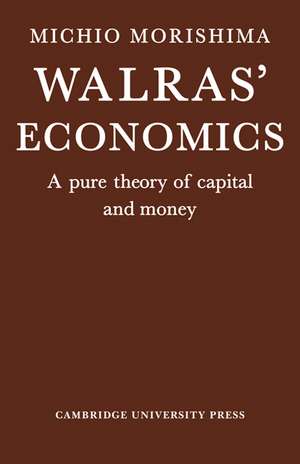Walras' Economics: A Pure Theory of Capital and Money
Autor Michio Morishimaen Limba Engleză Paperback – 2 sep 1981
Preț: 343.63 lei
Nou
Puncte Express: 515
Preț estimativ în valută:
65.75€ • 68.84$ • 54.41£
65.75€ • 68.84$ • 54.41£
Carte tipărită la comandă
Livrare economică 07-21 aprilie
Preluare comenzi: 021 569.72.76
Specificații
ISBN-13: 9780521285223
ISBN-10: 0521285224
Pagini: 224
Ilustrații: illustrations, index
Dimensiuni: 138 x 216 x 19 mm
Greutate: 0.29 kg
Ediția:Revised
Editura: Cambridge University Press
Colecția Cambridge University Press
Locul publicării:Cambridge, United Kingdom
ISBN-10: 0521285224
Pagini: 224
Ilustrații: illustrations, index
Dimensiuni: 138 x 216 x 19 mm
Greutate: 0.29 kg
Ediția:Revised
Editura: Cambridge University Press
Colecția Cambridge University Press
Locul publicării:Cambridge, United Kingdom
Cuprins
Preface; Introduction; Part I. Exchange and Production: 1. Arbitrage and exchange equilibrium; 2. The tâtonnement; 3. Walras' law and production; 4. The dual-adjustment rules: Walrasian and Keynesian; Part II. Economic Growth: 5. Capital formation and credit; 6. A neoclassical theory of growth; 7. Towards Keynes; Part III. Money and Interest: 8. The Walrasian prototype; 9. General equilibrium with encaisse désirée; 10. Alternative theories of interest; 11. The quantity theory of money; 12. Say's law; Part IV. Time Elements: 13. Capital and money reconsidered; Index.
Descriere
This book is a major attempt to reconsider Walras' place in the development of economic thought.













